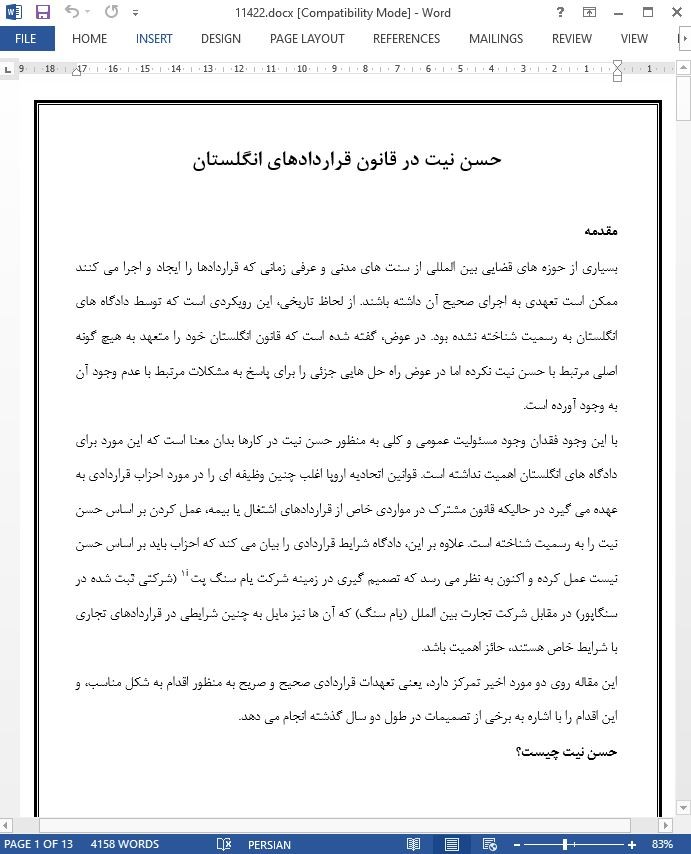
حسن نیت در قانون قراردادهای انگلستان
مقدمه
بسیاری از حوزه های قضایی بین المللی از سنت های مدنی و عرفی زمانی که قراردادها را ایجاد و اجرا می کنند ممکن است تعهدی به اجرای صحیح آن داشته باشند. از لحاظ تاریخی، این رویکردی است که توسط دادگاه های انگلستان به رسمیت شناخته نشده بود. در عوض، گفته شده است که قانون انگلستان خود را متعهد به هیچ گونه اصلی مرتبط با حسن نیت نکرده اما در عوض راه حل هایی جزئی را برای پاسخ به مشکلات مرتبط با عدم وجود آن به وجود آورده است.
با این وجود فقدان وجود مسئولیت عمومی و کلی به منظور حسن نیت در کارها بدان معنا است که این مورد برای دادگاه های انگلستان اهمیت نداشته است. قوانین اتحادیه اروپا اغلب چنین وظیفه ای را در مورد احزاب قراردادی به عهده می گیرد در حالیکه قانون مشترک در مواردی خاص از قراردادهای اشتغال یا بیمه، عمل کردن بر اساس حسن نیت را به رسمیت شناخته است. علاوه بر این، دادگاه شرایط قراردادی را بیان می کند که احزاب باید بر اساس حسن نیست عمل کرده و اکنون به نظر می رسد که تصمیم گیری در زمینه شرکت یام سنگ پت (شرکتی ثبت شده در سنگاپور) در مقابل شرکت تجارت بین الملل (یام سنگ) که آن ها نیز مایل به چنین شرایطی در قراردادهای تجاری با شرایط خاص هستند، حائز اهمیت باشد.
این مقاله روی دو مورد اخیر تمرکز دارد، یعنی تعهدات قراردادی صحیح و صریح به منظور اقدام به شکل مناسب، و این اقدام را با اشاره به برخی از تصمیمات در طول دو سال گذشته انجام می دهد.
Introduction
Many foreign jurisdictions of both civil and common law traditions have long recognised an obligation to act in good faith when making and performing contracts. Historically, this was not an approach recognised by the English courts. Rather, English law was said to have "committed itself to no... overriding principle [of good faith] but has developed piecemeal solutions in response to demonstrated problems of unfairness". 1
The absence of a general, overriding duty to act in good faith does not however, mean that this is not an issue with which English courts have had to grapple. EU legislation frequently imposes such a duty on contracting parties, 2 whilst the common law also recognises a duty to act in good faith in certain specific types of contract eg contracts of employment or insurance. What is more, the Courts will enforce express contractual terms that parties are to act in good faith and it would now seem in light of the decision in Yam Seng Pte Ltd (a company registered in Singapore) v International Trade Corporation Ltd3 ('Yam Seng') that they are also willing to imply such terms into commercial contracts in certain circumstances.
This article focuses on the last two of those eventualities, namely express and implied contractual obligations to act in good faith, and it does so with reference to a number of decisions of the last two years.
مقدمه
حسن نیت چیست؟
شرایط بیان کردن
مسئولیت ضمنی
مسئولیت مذاکره کردن
وضعیت یام سنگ
نتیجه گیری
Introduction
What is good faith?
Express terms
Implied duty
Duty to negotiate
Status of Yam Seng
Conclusion
- اصل مقاله انگلیسی با فرمت ورد (word) با قابلیت ویرایش
- ترجمه فارسی مقاله با فرمت ورد (word) با قابلیت ویرایش، بدون آرم سایت ای ترجمه
- ترجمه فارسی مقاله با فرمت pdf، بدون آرم سایت ای ترجمه

